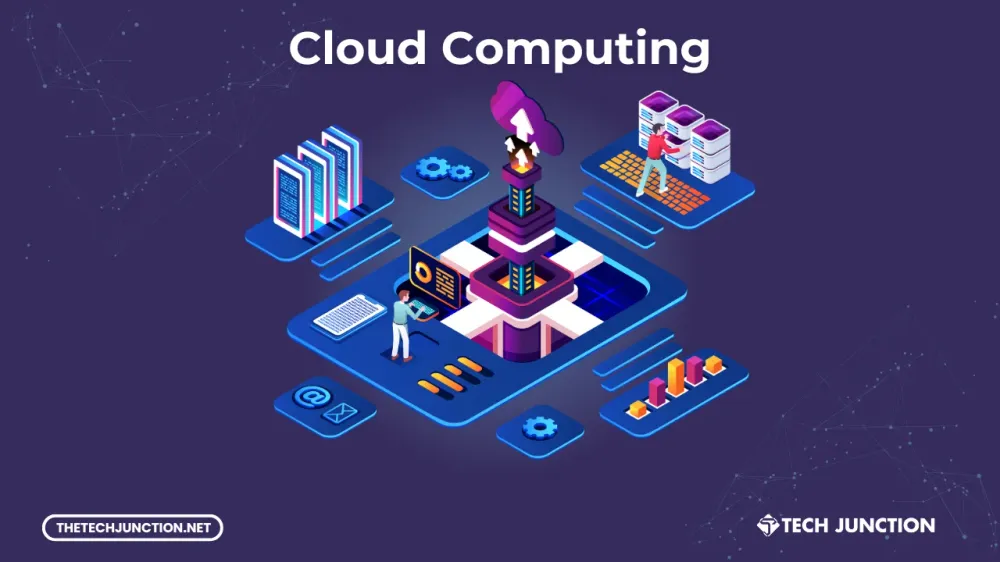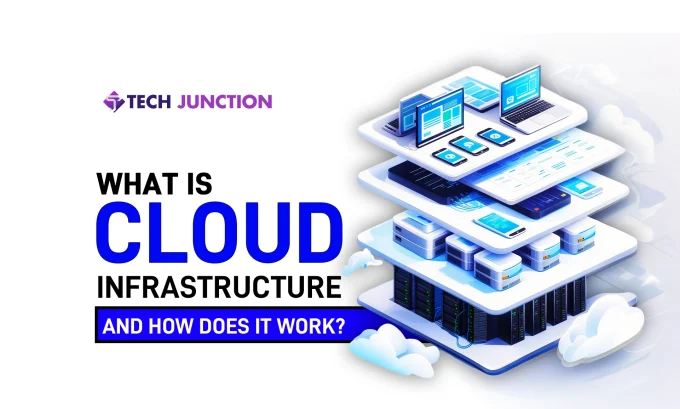The latest technologies have made our work culture much easier and more flexible. After the COVID-19 pandemic, the world realized just how capable we are of working from home. But now that things are back to normal, it’s time to step out and try a new way of life. Picture this: you are sitting at a café, sipping your coffee, and you need to access your work files. You don’t need to lug around your laptop or worry about your office desktop. You just log in on your phone and get what you need instantly. That’s cloud computing at work!
It’s not as complicated as it sounds, and you’re probably using it every day without realizing it. In this blog, we’ll break down what cloud computing is, why it’s important, and how it has become the backbone of modern business operations.
What is Cloud Computing?
Simply put, cloud computing allows businesses to store data, run applications, and access software over the Internet rather than using local computers or servers. Instead of storing everything on your company’s hard drive or expensive servers, cloud computing lets you access and manage your business tools and data from anywhere, as long as you have an internet connection.
You only pay for what you use, which makes it cost-effective and flexible. This flexibility has been a major win for businesses of all kinds, and they can save money on physical infrastructure and IT staff.
Related Article:
Top 10 AI Tools for Small Businesses
How Does Cloud Computing Work?
Cloud infrastructure in cloud computing works by using a network of servers, often referred to as the “cloud,” to store and process data. These servers are typically managed by third-party providers like Google, Microsoft, or Amazon. When you need to access your business tools or data, you simply log in online, and everything is available to you.
For example:
- If you use Google Docs, you’re working on the cloud.
- When you store photos on Google Drive or iCloud, that’s cloud storage.
- Even streaming shows on Netflix or Spotify happens on the cloud.
The great thing is that it’s all stored remotely, so your data isn’t tied to one specific computer or office server. You can access it easily from your PC, laptop, tablet, or even your phone, giving you the freedom to work from anywhere.

Different Types of Cloud Hosting: What’s Right for You?
Not all cloud services are the same. There are different types of cloud hosting: public, private, and hybrid clouds.
Public Cloud: This is when the cloud service is hosted and maintained by any third-party provider, and your data shares space with other businesses. This type is cost-effective and flexible, making it a great option for small businesses.
Private Cloud: A private cloud is used exclusively by your company. It’s often managed on your own servers or through a third-party provider, but all the data and resources are yours alone. While it provides more control and security, it’s more expensive.
Hybrid Cloud: A mix of both private and public clouds, giving businesses the flexibility to store sensitive data in a private cloud and less critical data in a public cloud.
Each type has its benefits, so the choice depends on what’s most important for your business: cost, control, or security.
Key Benefits of Cloud Computing for Businesses
Adopting cloud computing can have a big impact on how a business operates. Here are some of the major benefits of cloud computing for business that make it appealing:
1. Accessibility from Anywhere
The most important advantage of cloud computing is that you can access your business files and applications from any digital device with an internet connection. It is accessible whether you are in the office or you are traveling; you will have instant access to everything you need.
2. Easier Collaboration
One of the best things about cloud computing is that it makes collaboration super easy. Using modern cloud infrastructure, multiple people can work on the same document at the same time, and any updates are automatically saved. Cloud computing for companies is the perfect solution when you are working on a project with your team across town or across the world. Every team member will have the most up-to-date version of the file.
3. Scalability and Flexibility
Cloud services are scalable, which means you can easily add or remove users or accounts and resources based on your business needs. If your business grows or slows down, you don’t have to worry about buying new servers or hardware. You only pay for what you use, and you can adjust your plan anytime.
4. Cost-Effective
With cloud computing, you don’t need to invest in expensive hardware or maintain a large IT team. Everything is handled by your cloud service provider, saving you time and money. The cloud also reduces the need for physical storage space, which can be costly.
5. Improved Security
The security of data might seem like a concern when your data is hosted off-site, cloud providers invest heavily in keeping your information safe. Most cloud services include encryption, firewalls, and regular backups to ensure your data is protected. If something goes wrong, cloud services make it easy to restore lost data.
6. Easy Data Backup and Recovery
If, for some reason, you have lost your data, backing up your business data is critical, especially if your physical hardware fails or is damaged. But with cloud computing, your data is automatically backed up, so you don’t have to worry about losing important files. In the event of an emergency, cloud providers can quickly restore your data, reducing downtime.
7. Support for Remote Work
Remote work is here to stay, and cloud computing evolution makes it possible for employees to access everything they need without being in the office. Cloud-based solutions allow teams to communicate, collaborate, and work efficiently from anywhere in the world.
8. Automatic Software Updates
You need to use the latest version of the software, and with cloud computing, your software is always up to date. Cloud providers handle all the updates and upgrades, so you don’t need to worry about installing patches or new versions. This helps keep your software running smoothly and securely without extra effort on your part.
9. Disaster Recovery
In case of a natural disaster, power outage, or technical failure, cloud computing makes sure that your data is stored safely off-site. With proper disaster recovery plans in place, you can quickly recover lost data and continue business operations with minimal disruption.
Is Cloud Computing Right for Your Business?
Now that we have clarity about the benefits and importance of cloud computing, it is also important to consider the potential drawbacks. So some businesses may face concerns about data security, especially if sensitive information is stored in the cloud. There are also questions of data privacy and compliance, particularly for industries that handle regulated information.
However, with the right cloud service provider and security measures, these risks can be minimized. It is crucial to thoroughly vet cloud providers and make sure they meet your security and compliance requirements.
Moving Forward with Cloud Computing
As more and more businesses move to the cloud, the advantages of cloud computing are becoming impossible to ignore. Cloud computing offers greater flexibility, cost savings, and easier collaboration, which makes it an essential technology for business operations. It is for everyone, and for small startups or large enterprises, the cloud can help streamline your business operations, improve efficiency, and enhance productivity.
If you are still unsure about making the switch to the cloud, start small. You can begin by moving certain applications or data to the cloud and gradually expand from there.
Cloud computing is the backbone of modern business, offering flexibility, scalability, and efficiency to help businesses grow and innovate.
The Tech Junction is the ultimate hub for all things technology. Whether you’re a tech enthusiast or simply curious about the ever-evolving world of technology, this is your go-to portal.















